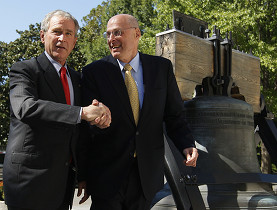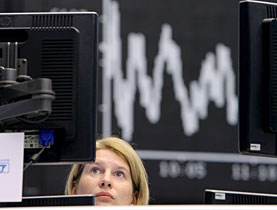Government promises action in financial crisis

The Swiss government says it will act to help stabilise the country's financial system in the wake of the global financial crisis.
Acting Finance Minister Eveline Widmer-Schlumpf made the comments after the Swiss stock exchange suffered its worst day since September 11, 2001, with banks and insurance companies among the hardest hit.
Widmer-Schlumpf said the Federal Banking Commission had taken supervisory measures and the Swiss National Bank was providing sufficient liquidity to money markets.
“The cabinet will, if it is necessary, take further measures for the stabilisation of the finance system,” she said.
She said the government wanted to act to secure banking customer deposits.
The government believed capital and liquidity were key to the stabilisation of the financial system, as well as dealing with difficulties in bank’s balance sheets and protecting depositors.
But banks still had to make extra efforts, added Widmer-Schlumpf, who is standing in as finance minister for Hans-Rudolf Merz.
Swiss savers are currently covered by a banking fund guarantee of up to SFr30,000 ($26,250) per person in the event of a private bank collapse. The fund for the whole banking sector amounts to SFr4 billion.
Credit jitters
Zurich’s blue-chip SMI index lost 6.12 per cent of its value on Monday as European markets absorbed the effects of the global financial crisis.
Shares in private bank Julius Baer led the sell-off, ending 15.3 per cent lower than at the close on Friday.
Swiss Re suffered a 13.4 per cent drop in the price of its stock, while shares in Switzerland’s largest bank UBS lost 12.8 per cent of their value.
Swiss-Swedish electrical engineering firm ABB was also hit, closing almost ten per cent lower.
European shares posted their worst day on record and the Dow Jones industrial average slipped below 10,000 points on Wall Street for the first time since October 2004 as markets reeled on credit jitters and fears of the fallout from a potential global recession.
This followed the emergency rescue of two big European banks and a move by several European governments to guarantee bank deposits.
European central banks have proposed offering more than $74 billion in short-term loans to banks to boost liquidity.
Several European Union member states, notably Ireland, Germany, Portugal, Spain and Iceland, have also agreed to unilaterally guarantee public savings in struggling banks.
Individual European governments have issued deposit guarantees of between €20,000 (SFr31,000) and €100,000 to shore up their banks but there has not been any coordinated action to deal with the crisis.
EU finance ministers are due to meet in Luxembourg on Tuesday for emergency talks on the crisis.
swissinfo with agencies
The turmoil on the financial markets was sparked by the subprime crisis in the US, where borrowers were granted mortgages they were unable to pay back.
This led to a shortfall in liquidity in financial institutions, making it harder for them to carry on their business.
The bank rescue plan hammered out by the US administration and leaders of both Republican and Democrat parties was supposed to stop the collapse of financial institutions by injecting the necessary finance to enable them to continue trading.
The US House of Representatives initially rejected the plan, sparking further alarm on global markets.
The Senate accepted a modified version of the package and the House passed it last week.
Leaders of Europe’s four main economic powers met in Paris on Saturday to prepare for a larger summit to deal with the crisis. Various European governments have already injected money into some of their own major banks and financial institutions to prevent them collapsing.
Manuel Ammann, a University of St Gallen professor of finance, says the “fairly weak” Swiss banking fund guarantee of up to SFr30,000 should be increased. He says the guarantee system needs to be re-examined and should not penalise banks that are not risk-takers.

In compliance with the JTI standards
More: SWI swissinfo.ch certified by the Journalism Trust Initiative



You can find an overview of ongoing debates with our journalists here. Please join us!
If you want to start a conversation about a topic raised in this article or want to report factual errors, email us at english@swissinfo.ch.